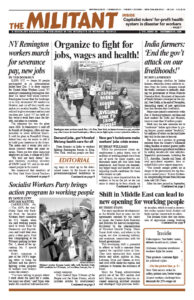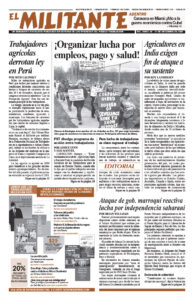December 25, 1995
PARIS — Sixteen days into the national rail strike nothing is moving. Hundreds of thousands of phone and power workers, subway and bus workers, municipal workers, teachers, hospital and other government workers, as well as students, have joined rail workers in a nationwide social protest movement against government plans to drastically reduce social security benefits.
“The strike was prompted by two things,” said Jean-Paul Danard, an engineer at the Montparnasse station. “The plan to cut social security payments and raise the minimum retirement age from 50 to 55, and the plan to privatize the railroads with the possible layoff of as many as 30,000 workers.”
“What we are fighting for is a different kind of society,” Dominique Larchet said. “A job is not a privilege, a wage is not a privilege.”
December 25, 1970
NEW YORK, Dec. 12 — Six hundred women braved freezing rain today to march for an end to all restrictions on abortion. On the eve of the march, it was expanded to include a defense of feminist Kate Millett.
The Dec. 14 issue of Time singled out Millett, author of Sexual Politics, for attack. Millett has recently acknowledged that she is bisexual. “This disclosure,” Time concludes, “is bound to discredit her as a spokeswoman for her cause, cast further doubts on her theories, and reinforce the views of those who routinely dismiss all liberationists as lesbians.”
The march established the Women’s Strike Coalition, a united front of close to 100 organizations, as a group that is prepared to respond to every form of oppression women face, be it from Time magazine or the city government.
December 22, 1945
General Motors has been howling “illegal” at the CIO auto workers’ picket lines. It began to call in the “law.” General Motors is paving the way for strikebreaking through injunctions. Sheriffs and federal marshals will be waving court orders before every picket line.
It’s been tried in at least two important auto strikes before. Toledo and Flint. The first, the birthplace of the fighting traditions of the UAW-CIO in the Toledo Auto-Lite Strike of 1934. The second, the center of the “sit-down” strike of 1937 that first humbled the General Motors empire. In each struggle, the strike boiled down to one question: How would the strikers meet the challenge of injunctions issued through the collusion of big money and compliant judges? In both cases, the answer was: “We will defy them!” And by successful defiance, the workers won.

